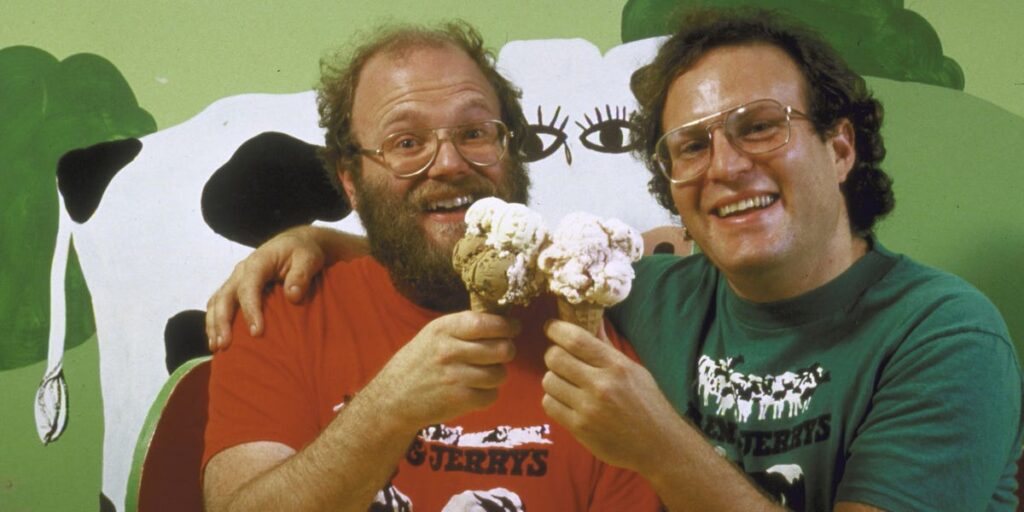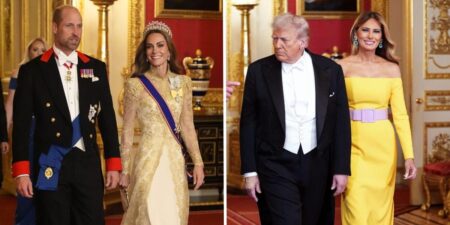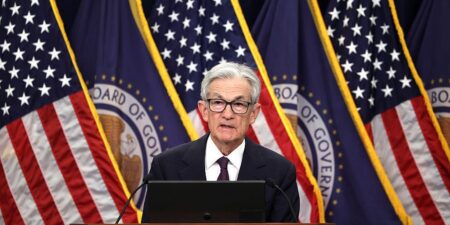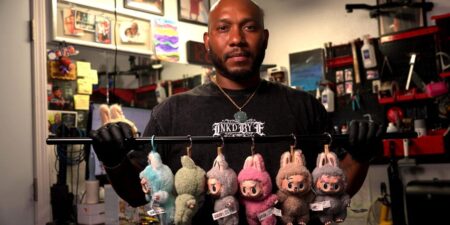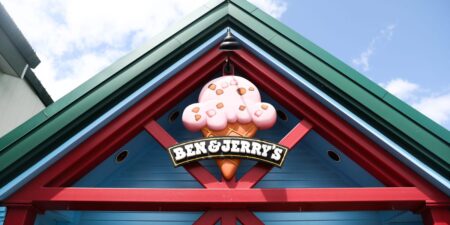Updated
X
Bluesky
Copy link
Impact Link
Save
Saved
Read in app
subscribers. Become an Insider
and start reading now.
Have an account? .
- Ben & Jerry’s was founded by Ben Cohen and Jerry Greenfield almost half a century ago.
- Greenfield and Cohen are childhood friends from Long Island, New York.
- Here’s the story of Ben & Jerry’s, from a gas station in Vermont to global distribution.
After nearly 50 years, ice cream’s most iconic duo is no more.
Jerry Greenfield, who founded Ben & Jerry’s alongside Ben Cohen, has resigned from the company. In a statement, Greenfield said Unilever, the ice cream brand’s parent company, is stifling its political and social mission.
“This is one of the hardest and most painful decisions I’ve ever made,” Greenfield said in the statement, which Cohen shared on X.
Ben & Jerry’s has made attention to social and political issues a key part of its values. After the murder of George Floyd in 2020, for example, the brand released a statement declaring: “We must dismantle white supremacy.”
Cohen and Greenfield have either been behind or supported many of the stances that the brand has taken.
Here is a look at how the ice cream empire came to be and the men behind it.
Ben Cohen and Jerry Greenfield, the cofounders of Ben & Jerry’s, met in middle school.
Cohen told the Washington Post in 2014 that he and Greenfield met when Greenfield passed out in gym class.
Greenfield told the Independent in 1995 that he and Cohen came from similar backgrounds. Greenfield’s father was a stockbroker, while Cohen’s was an accountant. He added that he follows the rules while Cohen has been known to break them.
During a 2012 keynote speech, Greenfield said he attended Oberlin College in Ohio and studied pre-med. Cohen went to college in upstate New York but dropped out, Greenfield said.
Greenfield moved in with Cohen in New York after graduating from college, The Independent reported.
Cohen and Greenfield wanted to open a bagel shop, but the equipment was too expensive.
Abandoning their original plan to open a bagel shop, Cohen and Greenfield told The Washington Post that they decided to attend a $5 ice cream-making course at Pennsylvania State University.
In 1978, the duo opened their first ice cream shop in a converted gas station in Burlington, Vermont. Each pitched in $4,000, and they got an additional $4,000 bank loan, Time reported in 2018. They also sold other food items like crêpes and soup. By the following year, ice cream was the only thing on their menu.
Cohen told The New York Times in 1994 that since he has a poor sense of smell and taste, Greenfield made the flavors, and he tasted them blindly. The goal was to make flavors intense enough for Cohen to taste with his eyes closed.
“Because of this disability, I have an excellent sense of mouthfeel. Creaminess and crunchiness are very important to people who can’t taste,” Cohen added.
By 1980, they were selling pints in grocery stores.
In 1980, Ben & Jerry’s expanded to grocery stores when Cohen and Greenfield started packing their ice cream into pint-sized containers. Seven years later, the company had grown to become worth $30 million, Time reported.
The first flavor they experimented with was vanilla, while “Cherry Garcia” is one of the ice cream empire’s oldest flavors. Named after Grateful Dead vocalist and lead guitarist Jerry Garcia, it features generous portions of cherries and fudge. The flavor has long been one of Ben & Jerry’s most popular.
Ben & Jerry’s has also collaborated on flavors with famous entertainers like Stephen Colbert, Jimmy Fallon, and Dave Matthews Band.
Since at least 2014 the company has published annual flavor rankings on its site. The flavor “Half Baked” has been a longtime winner. It combines chocolate and vanilla ice cream with chunks of chocolate chip cookie dough and fudge brownies.
Ben & Jerry’s and other ice cream brands are making Unilever billions.
In its 2024 annual report, Unilever said its ice cream brands — Ben & Jerry’s, Magnum, and Wall’s, had a “combined turnover” of €8.3 billion, or about $9.8 billion.
While expanding its business, the company also tackled social issues and charitable causes.
The company’s involvement in social causes stretches back decades. In 1992, the ice cream company helped the Children’s Defense Fund, a national nonprofit, send 70,000 postcards to Congress calling for prioritizing children’s basic needs.
In 1999, Ben & Jerry’s raised money for Childline, a counseling service in the UK. In 2004, Ben & Jerry’s worked with Rock the Vote to register 11,000 voters.
In 2005, the company teamed up with Greenpeace and the Alaska Wilderness League to protest oil drilling in the Arctic National Wildlife Refuge.
During Occupy Wall Street demonstrations in 2011, Ben & Jerry’s released a statement in solidarity with protesters and distributed ice cream to protesters in Zuccotti Park.
In 2016, the company released a statement titled “Why Black Lives Matter,” which called out systemic racism.
Laura Peterson, Ben & Jerry’s Public “Elations” Manager, told Business Insider that Greenfield and Cohen like to support the company’s social mission activities and sometimes appear at events.
Unilever purchased Ben & Jerry’s six years after Cohen stepped down as CEO.
In 1994, Cohen stepped down as CEO. Six years later, the multinational conglomerate Unilever bought Ben & Jerry’s for about $326 million, the outlet reported. The company didn’t cut any jobs.
”While I would have preferred for Ben & Jerry’s to remain independent, I’m excited about this next chapter,” Cohen said in a statement published in the Times. His statement also included lyrics from a Grateful Dead song.
Ben & Jerry’s told CNN Business in 2016 that Unilever’s 2000 purchase of the ice cream company didn’t affect the company’s voice on social issues. At the time, Unilever committed to creating a $5 million fund to help minority-owned businesses and poor neighborhoods.
Cohen and Greenfield remained Ben & Jerry’s employees. While they had no daily managerial responsibilities, they worked on some company projects.
Through decades of working together, the duo has managed to maintain a close friendship.
In a Reddit AMA in 2015, Cohen and Greenfield answered questions about their company and relationship.
Greenfield said that both he and Cohen believe “business should be using its power to help address social and environmental issues, and not just making money.” That belief, Greenfield says, helped define the company’s mission.
Greenfield said that they bond over their love for food.
At the same time, the duo shared that they have very different strengths. Greenfield says Cohen is more creative and spontaneous, while Cohen says Greenfield is more diplomatic.
Cohen and Greenfield also personally have a history of supporting social justice movements.
In 2016, police arrested Cohen and Greenfield during a “Democracy Awakening” protest in Washington, DC, aimed at protecting voting rights, among other issues.
In a statement about the arrest, the company said, “If you care about something, you have to be willing to risk it all — your reputation, your values, your business — for the greater good.”
Police arrested Cohen again while demonstrating against stationing F-35 fighter planes at an Air Force base in Burlington, Vermont. Peterson told Business Insider that Cohen’s arrest had nothing to do with the company and that he attended the protest as a private citizen.
In 2024, police arrested Cohen after he and others interrupted a Senate committee meeting to protest against the war in Gaza.
The company’s decision to take a stance on social justice issues has helped build its brand.
Former CEO Matthew McCarthy said in 2020 that Ben & Jerry’s takes its social mission seriously, explicitly stating its values and taking actions.
What sets Ben & Jerry’s apart, McCarthy said, is that it was built on explicitly stated values genuinely felt by its founders and employees.
McCarthy added that consumers and employees will likely not believe you if you take an insincere route to issue alignment. David Stever took over as CEO in 2023.
The company has released ice cream flavors like “Save Our Swirled” and “Justice Remix’d” that lean into social issues.
In 2015, Ben & Jerry’s released “Save Our Swirled,” a flavor dedicated to climate crisis awareness, and it renamed their Chocolate Chip Cookie Dough flavor “I Dough, I Dough” to celebrate the legalization of same-sex marriage.
When Ben & Jerry’s extended full benefits to the partners of employees in same-sex relationships back in 1989, it was a “fairly radical move,” the company said in a press release.
In 2018, the company came out with “Pecan Resist,” an ice cream flavor dedicated to resisting the “discriminatory policies” of President Donald Trump’s administration.
In September 2019, the ice cream empire released a flavor dedicated to addressing racial inequity called “Justice Remix’d.”
In 2020, Ben & Jerry’s released a statement in response to the killing of George Floyd.
Ben & Jerry’s response to the killing of George Floyd included a clear description of how Floyd died and called on Trump to denounce white supremacy.
The statement supported the family of George Floyd’s request for a national task force that prioritizes ending racial violence and holding police accountable.
Lastly, it called on the Department of Justice to better defend the rights of Black people and other people of color.
In 2021, Ben & Jerry’s said it would stop selling its ice cream in the Israeli-occupied Palestinian territories.
“We believe it is inconsistent with our values for Ben & Jerry’s ice cream to be sold in the Occupied Palestinian Territory (OPT),” the company said in a statement released in July that year. The statement was a boost to the Boycott, Divestment, and Sanctions movement, which aims to change the Israeli government’s treatment of Palestinians.
The move prompted criticism from politicians, including both Democrats and Republicans. Israeli officials also reportedly pressured Ben & Jerry’s and Unilever to reverse the decision.
All the while, Ben & Jerry’s kept selling ice cream in Israel.
The effects of Ben & Jerry’s decision lasted over a year and included a legal battle between the brand and Unilever.
After pushback, Unilever sold Ben & Jerry’s operations in Israel and the West Bank to a local businessman. Ben & Jerry’s sued its parent company over the deal, but a settlement at the end of 2022 kept it intact — and the brand’s ice cream on store shelves in the region, Reuters reported.
The companies disclosed few details of the settlement, with Unilever issuing a short statement that the lawsuit had “been resolved.”
It was a test for the corporate structure of Ben & Jerry’s, whose board was granted independence to pursue the company’s social mission when Unilever acquired the brand two decades earlier.
A 2023 investigation found that Ben & Jerry’s was one of many food companies that used migrant children as laborers to make its products.
The investigation, published in February 2023 by The New York Times, found that children who had come to the US by crossing the border with Mexico were working full-time jobs in food supply chains — including one that provides Ben & Jerry’s milk for the brand’s ice cream.
The Times summarized the response of Cheryl Pinto, Ben & Jerry’s head of values-led sourcing, by saying: “If migrant children needed to work full time, it was preferable for them to have jobs at a well-monitored workplace.”
In March 2024, Unilever said it would spin off its ice cream business, including Ben & Jerry’s.
Unilever said in March 2024 that the spin-off would be complete by the end of 2025 and involve cutting 7,500 jobs across its whole ice cream portfolio. It wasn’t immediately clear how Ben & Jerry’s would be affected by the job cuts.
While the details of the plan weren’t clear, a demerger “is the most likely separation route,” the company said in its statement.
Regardless of its final form, the decision is poised to cap a quarter-century of Unilever’s ownership of Ben & Jerry’s.
Ben & Jerry’s said Unilever ousted its CEO over activism.
Ben & Jerry’s sued Unilever in November 2024, accusing it of silencing statements about the war in Gaza. In court filings from March 2025, the ice cream company accused Unilever of ousting former CEO David Stever. Attorneys for Ben & Jerry’s said Unilever removed Stever after disagreements over the company’s social and political activism.
“Unilever has repeatedly threatened Ben & Jerry’s personnel, including CEO David Stever, should they fail to comply with Unilever’s efforts to silence the Social Mission,” the attorneys said in the lawsuit. “Unilever’s motive for removing Mr. Stever is his commitment to Ben & Jerry’s Social Mission and Essential Brand Integrity.”
In response, Unilever told Business Insider that “decisions on the appointment, compensation and removal of the Ben & Jerry’s CEO will be made by Unilever after good faith consultation and discussion with the B&J’s Independent Board.”
“Regrettably, despite repeated attempts to engage the Board and follow the correct process, we are disappointed that the confidentiality of an employee career conversation has been made public,” Unilever’s statement said. “We hope that the B&J Independent Board will engage as per the original, agreed process.”
Greenfield resigned from Ben & Jerry’s in 2025.
Cohen announced in September 2025 that Greenfield would resign from the company after 47 years, sharing a statement from Greenfield on X.
In his statement, Greenfield said Ben & Jerry’s previously had “independence to pursue our values, which was guaranteed when Unilever bought the company.”
“It’s profoundly disappointing to come to the conclusion that that independence, the very basis of our sale to Unilever, is gone,” Greenfield said. “And it’s happening at a time when our country’s current administration is attacking civil rights, voting rights, the rights of immigrants, women, and the LGBTQ community.”
Read the full article here







